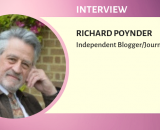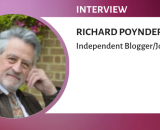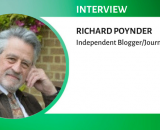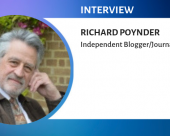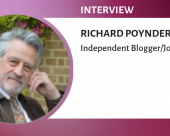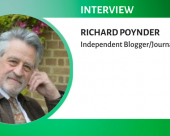We should persuade scientists to reimagine their relationship with the public
Interview with Richard Poynder
To celebrate the OA Week weekend, we bring you a series of insightful interviews with independent journalist/blogger Richard Poynder. Typically, the people who talk or write about scholarly publishing are academicians, librarians, authors, publishers, or editors themselves and their perspectives stem from their personal knowledge and experiences. But for Richard, being a non-academic does not get in the way of high-quality reporting. In an exciting four-part interview series, Richard talks to us about his interest in scholarly publishing, issues surrounding open access publishing today, the need for transparency in research and publishing, his view on the theme of the 2015 International Open Access Week, and much more!

In this final segment of my interview with independent journalist and blogger Richard Poynder, we discuss larger aspects such as the use of social media to talk about research and publication. Richard believes that the research and publishing community is still clumsy in its use of social media and that there is a need to fully understand the potential of social media platforms. Richard then shares some insights on a phenomenon that is fast catching on in research – Citizen Science. It is interesting to hear Richard interpret this trend in a realistic way and air benefits and flaws that may not have been discussed before!
Richard is well known for his work, most of which he publishes on his blog Open and Shut? Among Richard’s most popular publications are three series of interviews. The blog-based open-access book The Basement Interviews includes Richard’s interviews with leading advocates of the various open and free movements. The Open Access Interviews and The State of Open Access series document Richard’s conversations with open access advocates and practitioners. Richard is also moderator of the Global Open Access List (GOAL). Over the years, Richard’s work has received a lot of attention. Stevan Harnad, well-known open access activist described Richard as the “chronicler, conscience, and gadfly laureate” of the open access movement.
You are very active on social media. Which platform would you recommend as most effective to reach out to researchers and others interested in scholarly publishing? Would you encourage researchers and others with a keen interest to use social media more?
Yes, I use Twitter and Facebook and Google+. I think these are natural extensions to a blog. That said, I find Twitter most useful for my purpose—which is to provide a newsfeed covering open access-related issues. Twitter can also be used for promoting new interviews and articles posted to my blog. But, in fact, I find old-fashioned email lists to be more effective at this, presumably because a single tweet is quickly lost in people’s Twitter streams.
Is Twitter a good platform for everybody interested in scholarly publishing? Possibly, but I do not think social networking is ideal for advocacy, not least because it tends to create echo chambers, where like-minded people gather together and reinforce each other’s beliefs and prejudices. As a result, open access advocates can easily lose touch with what the rest of the research community thinks about open access. And if a hapless member of the research community expresses a sceptical view about open access, or makes what open access advocates deem to be a faux pas when discussing the topic, they can find themselves rounded on and verbally bludgeoned. That is not the way to win hearts and minds! Sometimes, even if a neutral perspective is presented, it might be shunned because neutrality is not always valued in advocacy.
I think that publishers could be more imaginative with the way they use social networks, rather than just as promotional channels. Let’s face it, it is pretty boring following a Twitter account that does no more than provide a constant stream of plugs for recently-published papers. You may ask me what they should do instead, but that’s for them to work out. When they do, the effectiveness of this new approach will be visible for all to see!
One thing that social networking platforms have shown themselves to be good at is conducting post-publication peer review. We saw this recently with critiques of Shen and Björk’s paper on predatory publishing.
We also saw it in 2010, when Rosie Redfield challenged the findings of a paper claiming to have demonstrated that arsenic-based life forms are possible. For obvious reasons, these critiques are usually posted on blogs, but judicious use of Twitter can considerably extend the reach of such critiques, and amplify the noise around them. However, the problem is that there seems to be a reluctance from researchers/publishers to respond to critiques that have been posted on blogs. So what people in the publishing industry, researchers and publishers need to do, perhaps, is change their perceptions about social media. Then they will be able to use it more effectively.
How aware do you think the general public is about the concept of open access to research? Do people realize the significance of having research-related information easily available? If not, what can be done to educate the masses about open access?
I suspect the public has little or no awareness of open access and so does not realise the significance of having research-related information easily available. If lay people are aware of open access, they probably associate it with predatory publishing since the mainstream media have reported on this quite a bit recently.
Finally, what significance and potential do you think citizen science has in the larger scheme of things today?
I think citizen science has a great deal of potential. But depending on how you define it, it is not necessarily a new phenomenon. There have always been amateur scientists, or scientists who do not have formal training, for instance. If you run a search for these two terms, you will find quite a number of pages on the Web devoted to the topic. The names that usually crop up on these sites include people like Gregor Mendel, David Levy, Henrietta Swan Leavitt, Joseph Priestley, Michael Faraday, Grote Reber, Thomas Jefferson, Susan Hendrickson, Felix d'Herelle, William Herschel and his sister Caroline Herschel, Thomas Edison, Forrest Mims, David Levy, Randy McCranie, and Srinivasa Ramanujan.
The problem I see is that citizen scientists appear, today, to be viewed primarily as free labour for crowdsourcing projects. So they are despatched to count butterflies, bugs or birds, or stare at images of galaxies on their computer, and then feed the results back to real scientists in the lab. This activity is clearly valuable, but seems to imply that the role of citizens in science is to do the grunt work, while the real science continues to be undertaken by professionals. I would hope we can move beyond that.
It is worth noting, for instance, that some of those listed on the sites I linked to above—e.g. Caroline Herschel and Henrietta Swan Leavitt—began by simply counting things, or assisting professional scientists. But later, they graduated to doing real science themselves (although Leavitt received little recognition for this in her lifetime).
I think the heart of the issue is that professionals tend to differentiate themselves from the pack by assuming that they have special intellectual skills that enable them to generate and understand arcane knowledge in ways that lay people cannot, and that this should earn them privileges. Some scientists clearly are specially gifted, but many would be more accurately described as no more than knowledge workers. Nevertheless, they do not wish to give up their privileged status as the gatekeepers of knowledge, and so they are resistant to amateurs invading their territory — a point made by The Scientist in 1996.
Even open access advocates tend to assume that the purpose of open access is to make research available to other scientists, and only coincidentally to the public. The public’s interest in open access, they assert, is simply to be able to see how taxpayer’s money is being spent.
My thinking, therefore, is that before we devote a lot of time to educating the public about open access, we might want to try and persuade scientists to reimagine their relationship with that public. This has occurred to me on a number of occasions when interacting with medical professionals. Recently, for instance, my foot started giving me gip. After sending me for an MRI scan, the consultant announced that he was going to fuse some of the bones in my foot. By way of explanation, he simply said the scan indicated that there was some degeneration in the bones. He did not talk me through the issues, he simply handed me a consent form and told me to sign it.
As the consultant’s explanations as to why I needed the procedure, what it would involve, and what downsides there might be, were somewhat scant, I asked if he could point me to two or three papers on the procedure that I could refer to. This evidently surprised him and he responded by saying that he could assure me the procedure has an 80% success rate. When I persisted, he agreed to send me some references to relevant papers. That was some time ago. I am still waiting for that information. Of course, if I do ever get the references the next challenge will be finding some way of accessing the research!
In the meantime, I have put the proposed operation on hold, and am left wondering why it is problematic to give a patient detailed information about a procedure that a surgeon wants to undertake on him or her.
One final point on this: The other day, I discovered that a relative of mine, a retired chief financial officer at an investment company, has posted 34 math papers to arXiv. These cover topics like the Riemann zeta function, Euler summation, and Stieltjes constants. I am not myself able to judge the value and quality of this work, but I note the papers have been critiqued by professional mathematicians and cited in Wikipedia. I doubt those who have commented on my relative’s work know that he is an ordinary member of the public as he attaches only his name and his address to the papers.
Recently he started counting the number of papers that he has cited that are available on an open access basis. He then records this information in the paper, along with an exhortation to others to make all their work open access, saying, “the mathematics community should lead the way on this by publishing everything on arXiv, or in an equivalent open access repository. We think it, we write it, so why hide it? You know it makes sense.”
Why would he not support open access? As a member of the public, he does not have access to math journals, and so cannot access the papers in them. The question is this: do open access advocates want laypersons like him, or only other professional scientists like themselves, to have access to these papers?
Thanks for the fantastic interview, Richard!
Other parts in the series:
Published on: Oct 27, 2015
Comments
You're looking to give wings to your academic career and publication journey. We like that!
Why don't we give you complete access! Create a free account and get unlimited access to all resources & a vibrant researcher community.





